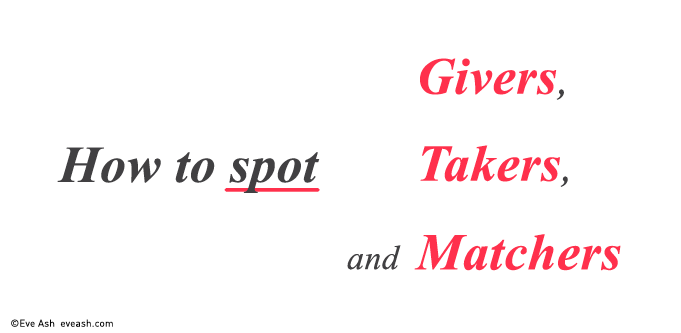Adam Grant has a terrific TED Talk about “givers”, “takers” and “matchers” in the workplace. The descriptions are self-evident to some degree: we all know those who really do go out of their way to help others versus those who are much more interested in what others can do for them.
The matcher
The “matcher”, according to Grant, is a person who tries to give and take in equal proportions. That is, they’ve worked out that too much giving leads to burn-out and always taking isolates a person sooner or later.
Are you a giver, taker or matcher?
We all know where we sit on this spectrum, if we’re honest with ourselves. The characterisations aren’t set in stone either; you might be a giver at work, but demand a great deal from your loved ones, or vice versa. Some people are matchers by instinct; many of us learn a balance between the extremes through bitter experience.
When there’s a taker on the team or in your life it can be very draining and often the desire to avoid that person or complain about that person begins. When there’s a taker around it “feels” as if they are selfish and annoying, but that doesn’t mean their work is poor quality or that they are a bad person.
The pros and cons of being a giver
More concerning is what Grant found from surveying 30,000 people across the world from different cultures. He initially discovered the “worst” performers in engineering and the medical profession were the givers. This was because the givers were so busy helping others that their own studies or results suffered. One “giving” salesperson explained that he cared so much about his customers, he didn’t want to sell them crappy products (cue: much laughter from the TED audience).
Digging deeper, Grant learned that in fact, givers’ generosity of spirit and behaviour is in fact what enriches workplaces, both in terms of revenue and profits, and customer and employee satisfaction. Put simply, they add value. As Grant explains:
“We have a huge body of evidence — many, many studies looking at the frequency of giving behaviour that exists in a team or an organisation — and the more often people are helping and sharing their knowledge and providing mentoring, the better organisations do on every metric we can measure: higher profits, customer satisfaction, employee retention — even lower operating expenses. So givers spend a lot of time trying to help other people and improve the team, and then, unfortunately, they suffer along the way.”
Hire more givers
Grant concedes that most people learn to be matchers, and of course, the takers by definition would never dream of putting themselves in the interests of a cause greater than their own. He favours hiring more givers, however, because matchers tend to follow the norm. The ideal office has an abundance of givers, matchers for ballast, and maybe a few takers, providing they don’t view the place as their personal fiefdom.
Tips for recruiting your team
Grants’s tips for recruiting or putting office teams together are:
- Don’t just bring on board the givers while weeding out the takers. You do need a few takers, if only because they’re supreme at saying “no” — sometimes this has to be done. Givers can be over-generous with time, energy, even office resources. Their biggest lesson is giving, albeit in smaller doses;
- Choose wisely with givers and takers, particularly those that take it to extremes (remembering that most people are matchers, and don’t accordingly exhibit such traits). Givers can become martyrs, and drag an office’s energy to very low levels, while the habitual taker is generally selfish and dogmatic. Both are impeding the workplace culture;
- Don’t be fooled by appearances. Grant admits he believed givers were agreeable, while takers weren’t. Not so. Some of the most giving can be abrupt in manner, while takers seem friendly and amenable (I’ve encountered quite a few in this category). It’s their actions over time that tell the story; and
- Watch out for fakes. Some people are keen to “prove” they are givers, even providing names of (influential) former colleagues who attest to this quality. Key to recognising this “faker” (a taker in disguise) is knowing they kiss on the way up, while kicking those beneath or behind them; it’s sometimes called the swinging door principle — they’ve used you and moved on to people who can help their career.
Nurture the givers
Grant’s chief message is to nurture the givers in your workplace (and life). You probably know who they are already. Make sure they take time to look after their own interests. Encourage them to do so and to seek help when they need it. “If we can weed takers out of organisations, if we can make it safe to ask for help, if we can protect givers from burnout and make it okay for them to be ambitious in pursuing their own goals as well as trying to help other people, we can actually change the way that people define success,” he concludes.
Success is about contribution – adding value
Instead of prioritising winning (as though everything’s a competition), Grant hopes that companies, and people, will realise that success is really more about contribution — adding value in both financial and non-financial ways.
It’s a message the best in our business and governance communities recognise, and our society is healthier and better-balanced for it.
NOW READ: Someone needs appreciation – a thank you!
NOW WATCH: Green & Giving, Inspirational Leadership, You Manage the Culture

